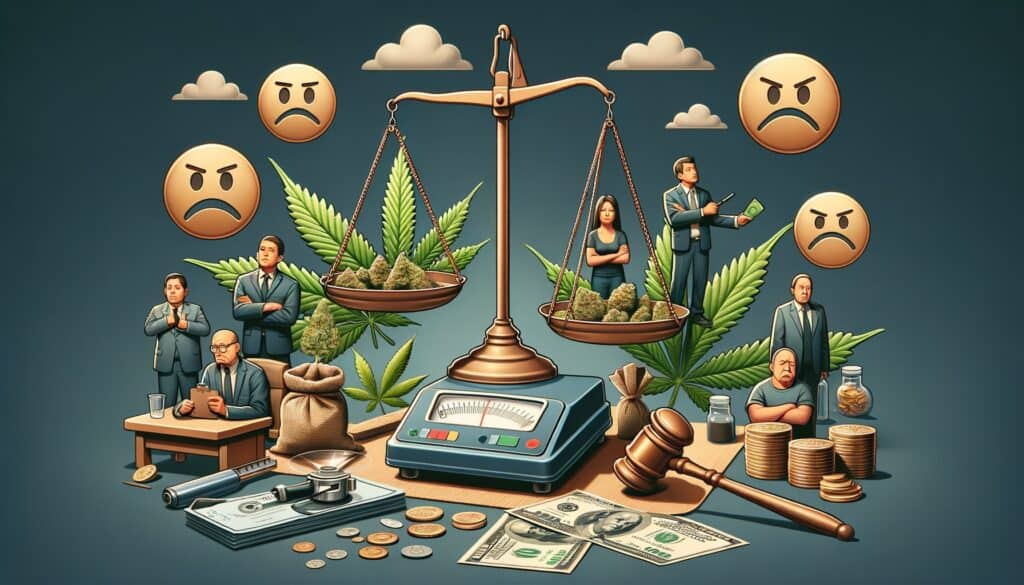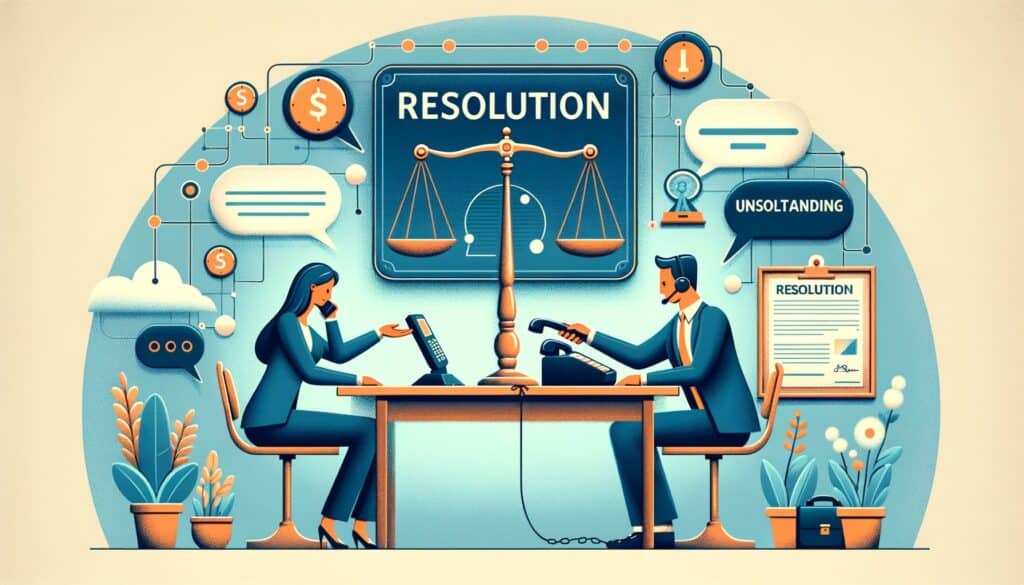
By Karen Henriques December 30, 2024
Payment disputes in marijuana sales can be a complex and challenging issue for businesses operating in the cannabis industry. With the legalization of marijuana in many states, the industry has experienced significant growth, leading to an increase in transactions and potential payment disputes. Understanding how to handle these disputes is crucial for businesses to maintain positive relationships with customers, suppliers, and distributors, while also protecting their financial interests.
In this comprehensive guide, we will explore the various aspects of payment disputes in marijuana sales, including the legal framework, common causes of disputes, steps to prevent disputes, and strategies for handling disputes with customers, suppliers, and distributors.
We will also discuss mediation and arbitration as alternative dispute resolution methods and the legal recourse available for businesses facing payment disputes. Additionally, we will provide best practices for documenting and recording payments to ensure transparency and accuracy in financial transactions.
Understanding the Legal Framework for Marijuana Sales

Before delving into the intricacies of payment disputes in marijuana sales, it is essential to have a clear understanding of the legal framework surrounding the industry. While marijuana has been legalized for medical or recreational use in many states, it remains illegal at the federal level. This discrepancy between state and federal laws creates unique challenges for businesses operating in the cannabis industry, including payment disputes.
At the state level, regulations vary significantly, with each state having its own set of rules and requirements for marijuana sales. These regulations often include licensing requirements, product testing, packaging and labeling guidelines, and restrictions on advertising and marketing. It is crucial for businesses to familiarize themselves with the specific regulations in their state to ensure compliance and mitigate the risk of payment disputes.
Furthermore, businesses operating in the cannabis industry face additional challenges when it comes to banking and payment processing. Due to the federal illegality of marijuana, many financial institutions are hesitant to provide banking services to cannabis businesses. This reluctance can result in limited access to traditional banking services, making it more difficult to handle payments and potentially leading to payment disputes.
Common Causes of Payment Disputes in Marijuana Sales

Payment disputes in marijuana sales can arise from various factors, including misunderstandings, discrepancies in pricing or quantities, product quality issues, delivery delays, and non-payment or late payment by customers. Let’s explore some of the common causes of payment disputes in more detail:
1. Misunderstandings: Miscommunication or misunderstandings between the buyer and seller can lead to payment disputes. This can occur when there is a lack of clarity regarding pricing, quantities, delivery terms, or payment terms. Clear and concise communication is essential to avoid misunderstandings and prevent payment disputes.
2. Pricing or Quantity Discrepancies: Disputes may arise when there are discrepancies between the agreed-upon price or quantity and what is actually delivered or invoiced. This can occur due to errors in recording or miscommunication during the ordering process. Accurate record-keeping and regular communication between the buyer and seller can help prevent such disputes.
3. Product Quality Issues: If the quality of the marijuana product does not meet the buyer’s expectations or the agreed-upon standards, it can lead to payment disputes. This can include issues such as mold, contamination, or inconsistent potency. Implementing quality control measures and conducting regular product testing can help minimize the risk of disputes related to product quality.
4. Delivery Delays: Delays in product delivery can result in payment disputes, especially if the buyer has already made payment but has not received the product within the agreed-upon timeframe. Clear communication regarding delivery timelines and proactive updates on any delays can help manage customer expectations and prevent disputes.
5. Non-payment or Late Payment: Non-payment or late payment by customers is a significant cause of payment disputes in marijuana sales. This can occur due to financial difficulties, disputes over product quality or delivery, or intentional non-payment. Implementing clear payment terms, conducting credit checks on customers, and having a robust collections process can help mitigate the risk of non-payment or late payment disputes.
Steps to Prevent Payment Disputes in Marijuana Sales

Prevention is always better than cure when it comes to payment disputes in marijuana sales. By implementing proactive measures, businesses can significantly reduce the likelihood of disputes and maintain positive relationships with customers, suppliers, and distributors. Here are some steps to prevent payment disputes:
1. Clear and Detailed Contracts: Establishing clear and detailed contracts with customers, suppliers, and distributors is essential to prevent payment disputes. Contracts should outline the terms and conditions of the transaction, including pricing, quantities, delivery terms, payment terms, and any applicable warranties or guarantees. Having a legally binding contract can provide clarity and protect the interests of all parties involved.
2. Accurate and Transparent Pricing: Ensuring accurate and transparent pricing is crucial to prevent disputes related to pricing discrepancies. Businesses should clearly communicate their pricing structure, including any applicable taxes or fees, and provide detailed invoices that clearly outline the breakdown of costs. Regularly reviewing and updating pricing information can help maintain accuracy and transparency.
3. Robust Quality Control Measures: Implementing robust quality control measures is essential to prevent disputes related to product quality. This can include regular product testing, adherence to industry standards and regulations, and maintaining accurate records of product quality and testing results. By consistently delivering high-quality products, businesses can minimize the risk of disputes and maintain customer satisfaction.
4. Efficient Delivery Processes: Timely and efficient product delivery is crucial to prevent disputes arising from delivery delays. Businesses should establish clear delivery processes, including realistic timelines, tracking mechanisms, and proactive communication with customers regarding any potential delays. Regularly reviewing and optimizing delivery processes can help ensure smooth and timely product delivery.
5. Clear Payment Terms and Policies: Clearly communicating payment terms and policies to customers, suppliers, and distributors is essential to prevent disputes related to non-payment or late payment. This can include specifying payment due dates, accepted payment methods, any applicable discounts or penalties for early or late payment, and the consequences of non-payment. Providing this information upfront can help manage expectations and encourage timely payment.
6. Regular Communication and Relationship Building: Maintaining regular communication and building strong relationships with customers, suppliers, and distributors can help prevent payment disputes. By fostering open lines of communication, businesses can address any concerns or issues promptly, resolve disputes amicably, and build trust and loyalty with their business partners.
How to Handle Payment Disputes with Customers

Despite taking preventive measures, payment disputes with customers may still occur in marijuana sales. Handling these disputes effectively is crucial to maintain positive customer relationships and protect the financial interests of the business. Here are some steps to handle payment disputes with customers:
1. Gather Relevant Information: When a payment dispute arises, it is essential to gather all relevant information related to the transaction. This includes invoices, contracts, delivery records, communication logs, and any other documentation that can help establish the facts of the dispute. Having a comprehensive record of the transaction can facilitate a fair and informed resolution.
2. Communicate with the Customer: Open and honest communication with the customer is key to resolving payment disputes. Reach out to the customer to understand their concerns and gather their perspective on the issue. Listen actively, remain calm and professional, and assure the customer that you are committed to finding a mutually satisfactory resolution.
3. Investigate the Issue: Once you have gathered all relevant information and communicated with the customer, conduct a thorough investigation into the issue. This may involve reviewing internal records, consulting with relevant team members or departments, and potentially seeking external expertise if necessary. The goal is to identify the root cause of the dispute and determine the appropriate course of action.
4. Offer a Solution: Based on the findings of the investigation, propose a fair and reasonable solution to the customer. This may involve offering a refund, replacement product, credit towards future purchases, or any other appropriate resolution. Be prepared to negotiate and find a middle ground that satisfies both parties.
5. Document the Resolution: Once a resolution has been agreed upon, document the details of the resolution in writing. This can include a summary of the issue, the proposed solution, and any agreed-upon terms or conditions. Both parties should sign and retain a copy of the document for future reference.
6. Follow Up: After the resolution has been implemented, follow up with the customer to ensure their satisfaction and address any remaining concerns. This demonstrates your commitment to customer service and can help rebuild trust and maintain a positive relationship.
Resolving Payment Disputes with Suppliers and Distributors
Payment disputes can also arise with suppliers and distributors in the marijuana industry. Resolving these disputes is crucial to maintain a reliable supply chain and ensure the smooth operation of the business. Here are some steps to resolve payment disputes with suppliers and distributors:
1. Review the Contract: Start by reviewing the contract or agreement with the supplier or distributor to understand the agreed-upon terms and conditions. Pay close attention to any clauses related to payment, delivery, quality control, and dispute resolution. This will provide a framework for resolving the dispute and help ensure that both parties are acting in accordance with the contract.
2. Communicate with the Supplier or Distributor: Initiate a conversation with the supplier or distributor to discuss the payment dispute. Clearly communicate your concerns and provide any supporting documentation or evidence. Listen to their perspective and try to understand their point of view. Maintaining open lines of communication is essential to finding a mutually satisfactory resolution.
3. Seek Mediation or Arbitration: If direct communication with the supplier or distributor does not lead to a resolution, consider seeking mediation or arbitration as alternative dispute resolution methods. Mediation involves a neutral third party facilitating a discussion between the parties to help them reach a mutually acceptable resolution. Arbitration, on the other hand, involves a neutral third party making a binding decision on the dispute. Both methods can be less formal and costly than litigation and can help expedite the resolution process.
4. Document the Resolution: Once a resolution has been reached, document the details of the resolution in writing. This can include a summary of the issue, the proposed solution, and any agreed-upon terms or conditions. Both parties should sign and retain a copy of the document for future reference.
5. Maintain a Positive Relationship: After the payment dispute has been resolved, make an effort to maintain a positive relationship with the supplier or distributor. Regularly communicate, provide feedback, and address any concerns promptly. Building strong relationships based on trust and open communication can help prevent future payment disputes.
Mediation and Arbitration in Marijuana Payment Disputes
Mediation and arbitration are alternative dispute resolution methods that can be used to resolve payment disputes in the marijuana industry. These methods offer several advantages over traditional litigation, including cost-effectiveness, confidentiality, and the ability to reach a resolution more quickly. Let’s explore mediation and arbitration in more detail:
Mediation:
- Mediation involves a neutral third party, known as a mediator, facilitating a discussion between the parties to help them reach a mutually acceptable resolution.
- The mediator does not make a binding decision but instead assists the parties in finding common ground and exploring potential solutions.
- Mediation is a voluntary process, and the parties have control over the outcome. They can choose to accept or reject any proposed resolution.
- Mediation is often less formal and adversarial than litigation, allowing for more open and constructive communication between the parties.
- The mediator’s role is to facilitate the negotiation process, encourage dialogue, and help the parties explore creative solutions to the dispute.
- Mediation can be particularly beneficial in preserving business relationships, as it allows the parties to maintain control over the outcome and find a resolution that meets their needs.
Arbitration:
- Arbitration involves a neutral third party, known as an arbitrator, making a binding decision on the dispute.
- The arbitrator acts as a judge and considers the evidence and arguments presented by both parties before rendering a decision.
- Arbitration can be either voluntary or mandatory, depending on the terms of the contract or agreement between the parties.
- The decision of the arbitrator is final and legally binding, and the parties are generally not able to appeal the decision.
- Arbitration can be more formal and structured than mediation, resembling a mini-trial with rules of evidence and procedure.
- Arbitration can be a faster and more cost-effective alternative to litigation, as it avoids the lengthy court process and associated expenses.
Legal Recourse for Payment Disputes in Marijuana Sales
In some cases, payment disputes in marijuana sales may escalate to the point where legal recourse becomes necessary. While litigation should generally be considered a last resort due to its cost and time-consuming nature, it can provide a means to resolve disputes when all other options have been exhausted. Here are some key considerations regarding legal recourse for payment disputes:
1. Consult with an Attorney: If you are considering legal recourse for a payment dispute, it is crucial to consult with an attorney who specializes in cannabis law. They can provide guidance on the specific legal requirements and potential risks associated with pursuing litigation.
2. Review the Contract: Review the contract or agreement with the other party to understand the rights and obligations of each party. Pay close attention to any dispute resolution clauses, which may require the parties to engage in mediation or arbitration before pursuing litigation.
3. Gather Evidence: Collect all relevant evidence to support your claim, including contracts, invoices, communication logs, delivery records, and any other documentation that can help establish the facts of the dispute. This evidence will be crucial in presenting your case in court.
4. Assess the Costs and Risks: Consider the potential costs and risks associated with litigation, including legal fees, court costs, and the potential impact on your business reputation. Litigation can be a lengthy and expensive process, and the outcome is not always predictable. It is important to weigh these factors against the potential benefits of pursuing legal recourse.
5. Explore Settlement Options: Before proceeding with litigation, consider exploring settlement options with the other party. This can involve engaging in negotiation or alternative dispute resolution methods such as mediation or arbitration. Settlement offers the opportunity to reach a resolution without the need for a court trial, potentially saving time and costs.
6. File a Lawsuit: If all other options have been exhausted and you decide to proceed with litigation, consult with your attorney to file a lawsuit. The lawsuit will outline your claims, the relief sought, and the legal basis for your claims. The other party will have an opportunity to respond, and the case will proceed through the court system.
Best Practices for Documenting and Recording Payments
Proper documentation and record-keeping are essential in handling payment disputes effectively. Here are some best practices to follow:
1. Maintain Detailed Records: Keep a record of all transactions, including invoices, receipts, and payment confirmations. This documentation will serve as evidence in case of a payment dispute.
2. Use Reliable Payment Systems: Utilize secure and reliable payment systems that provide detailed transaction records. This will help track payments and provide evidence of successful transactions.
3. Implement an Accounting System: Use an accounting system to accurately record and track all financial transactions. This will ensure that payments are properly documented and easily accessible when needed.
4. Regularly Reconcile Accounts: Regularly reconcile your accounts to ensure that all payments have been accurately recorded. This will help identify any discrepancies or errors that may lead to payment disputes.
FAQs
Q1. What should I do if a customer disputes a payment?
If a customer disputes a payment, gather all relevant evidence, review the complaint, communicate with the customer, and offer a fair resolution. If necessary, involve a neutral third party to mediate the dispute.
Q2. How can I prevent payment disputes in marijuana sales?
To prevent payment disputes, ensure transparent pricing, implement robust quality control measures, ensure accurate order fulfillment, use comprehensive contracts and agreements, and maintain effective communication channels with customers.
Q3. What should I do if I have a payment dispute with a supplier or distributor?
Review the contract, communicate with the other party, seek legal advice if necessary, and explore alternative dispute resolution methods such as mediation or arbitration.
Conclusion
Handling payment disputes in marijuana sales requires a proactive and professional approach. By understanding the legal framework, identifying common causes of disputes, and implementing preventive measures, businesses can minimize the risk of disputes.
In case of a dispute, effective communication, evidence gathering, and fair resolution offers can help resolve the issue amicably. Proper documentation and record-keeping are crucial throughout the process. By following these guidelines, businesses can navigate payment disputes in the cannabis industry successfully.